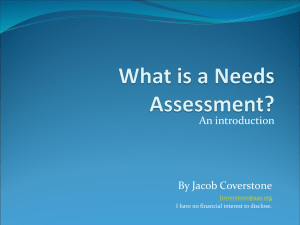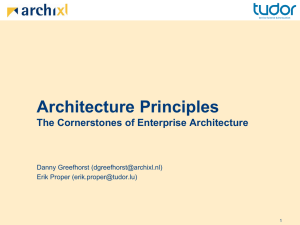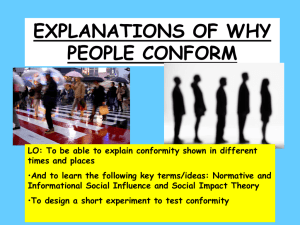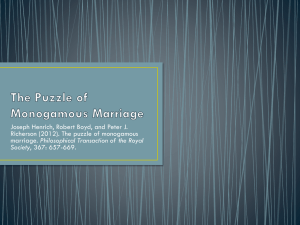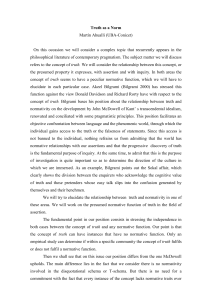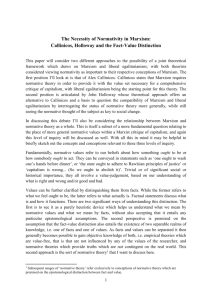Philosophical Logic
advertisement
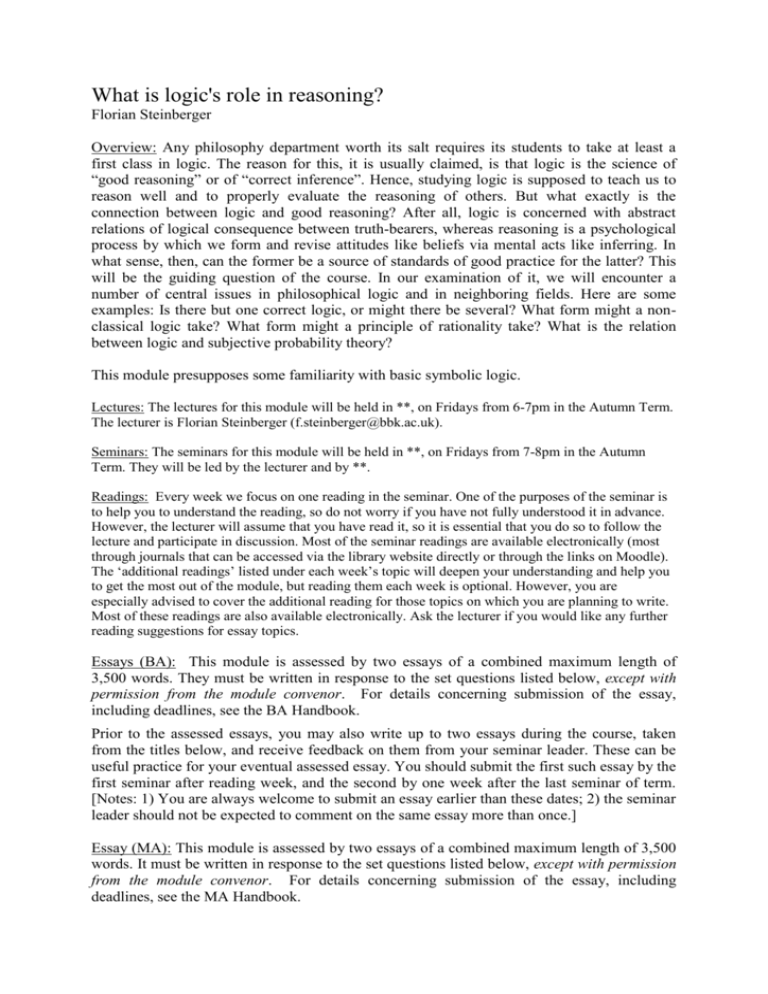
What is logic's role in reasoning? Florian Steinberger Overview: Any philosophy department worth its salt requires its students to take at least a first class in logic. The reason for this, it is usually claimed, is that logic is the science of “good reasoning” or of “correct inference”. Hence, studying logic is supposed to teach us to reason well and to properly evaluate the reasoning of others. But what exactly is the connection between logic and good reasoning? After all, logic is concerned with abstract relations of logical consequence between truth-bearers, whereas reasoning is a psychological process by which we form and revise attitudes like beliefs via mental acts like inferring. In what sense, then, can the former be a source of standards of good practice for the latter? This will be the guiding question of the course. In our examination of it, we will encounter a number of central issues in philosophical logic and in neighboring fields. Here are some examples: Is there but one correct logic, or might there be several? What form might a nonclassical logic take? What form might a principle of rationality take? What is the relation between logic and subjective probability theory? This module presupposes some familiarity with basic symbolic logic. Lectures: The lectures for this module will be held in **, on Fridays from 6-7pm in the Autumn Term. The lecturer is Florian Steinberger (f.steinberger@bbk.ac.uk). Seminars: The seminars for this module will be held in **, on Fridays from 7-8pm in the Autumn Term. They will be led by the lecturer and by **. Readings: Every week we focus on one reading in the seminar. One of the purposes of the seminar is to help you to understand the reading, so do not worry if you have not fully understood it in advance. However, the lecturer will assume that you have read it, so it is essential that you do so to follow the lecture and participate in discussion. Most of the seminar readings are available electronically (most through journals that can be accessed via the library website directly or through the links on Moodle). The ‘additional readings’ listed under each week’s topic will deepen your understanding and help you to get the most out of the module, but reading them each week is optional. However, you are especially advised to cover the additional reading for those topics on which you are planning to write. Most of these readings are also available electronically. Ask the lecturer if you would like any further reading suggestions for essay topics. Essays (BA): This module is assessed by two essays of a combined maximum length of 3,500 words. They must be written in response to the set questions listed below, except with permission from the module convenor. For details concerning submission of the essay, including deadlines, see the BA Handbook. Prior to the assessed essays, you may also write up to two essays during the course, taken from the titles below, and receive feedback on them from your seminar leader. These can be useful practice for your eventual assessed essay. You should submit the first such essay by the first seminar after reading week, and the second by one week after the last seminar of term. [Notes: 1) You are always welcome to submit an essay earlier than these dates; 2) the seminar leader should not be expected to comment on the same essay more than once.] Essay (MA): This module is assessed by two essays of a combined maximum length of 3,500 words. It must be written in response to the set questions listed below, except with permission from the module convenor. For details concerning submission of the essay, including deadlines, see the MA Handbook. Moodle: Electronic copies of course materials are available through Moodle, at http://moodle.bbk.ac.uk. You will need your ITS login name and password to enter. Week 1: Introduction Having reminded ourselves of couple of key concepts in logic (logical consequence, consistency, etc.), we ask what it might mean to say that logic is normative. What is meant by ‘logic’? And what is it supposed to be normative for? Finally, we discuss an influential criticism by Gilbert Harman. Reading: G. Harman. Change in view: Principles of reasoning. M.I.T. Press, Cambridge, 1986. [Ch. 1 & 2 – the relevant excerpts will be made available on Moodle.] Additional reading: G. Harman. Logic and reasoning. Synthese, 60:107-127, 1984. Week 2: A framework We discuss and explore John MacFarlane’s helpful analysis of the notion of a bridge principle as a way of conducting a systematic and precise investigation into Harman’s challenge. Reading: J. MacFarlane. In what sense (if any) is logic normative for thought? (unpublished), 2004. [We focus on sections 1–3.] Additional reading: J. Broome. Normative requirements. In J. Dancy (ed.) Normativity. Oxford University Press. P. Milne, What is the normative role of logic? Proceedings of the Aristotelian Society, 83: 269-298. C. Dutilh Novaes, A dialogical, multi-agent account of the normativity of logic. Dialectica (forthcoming). Week 3: Non-classical logics and logical pluralism This week constitutes an interlude during which we look at examples of non-classical logics, as well as the question as to whether there is but one true logic or whether there may be several equally admissible logics. Reading: G. Russell, Logical pluralism, The Stanford Encyclopedia of Philosophy (Spring 2015 Edition), E. Zalta (ed.), URL = <http://plato.stanford.edu/archives/spr2015/entries/logical pluralism/>. Additional reading: G. Priest, K. Tanaka, K. and Z. Weber, Paraconsistent logic, The Stanford Encyclopedia of Philosophy (Spring 2015 Edition), E. Zalta (ed.), URL = <http://plato.stanford.edu/archives/spr2015/entries/logic-paraconsistent/>. [Students are not expected to be familiar with technical details. All that matters is an appreciation of the main ideas and motivations.] Week 4: A normative argument for paraconsistent logics We discuss whether there is a tenable conception of the normativity of logic that supports arguments for paraconsistent revisions of our classical logical practices. Reading: F. Steinberger, Explosion and the normativity of logic. Mind (forthcoming). Week 5: A quantitative bridge principle We discuss Hartry Field’s proposal of a bridge principle that connects logical principles to degrees of belief rather than to full beliefs. Reading: H. Field. What is the normative role of logic? Proceedings of the Aristotelian Society, 83: 252-68, 2009. Additional reading: G. Harman. Field on the normative role of logic. Proceedings of the Aristotelian Society, 109: 333-35, 2009. A. Hajek. Probability, logic and probability logic. In L. Goble (ed.), Blackwell Companion to Philosophical Logic [Sections 1-4, 5] [Reading Week] Week 6: Three types of logical normativity We distinguish three different ways in which the question of the normativity of logic might be understood. What follows from making this three-way distinction both for the existing debate? And for our quest for a workable bridge principle? Reading: F. Steinberger, Three ways in which logic might be normative. MS. Week 7: Pluralisms and the normative force of logic We further pursue the question as to what it might mean for a logic to be normative from pluralist and from monist perspectives. Reading: H. Field, Pluralism in logic. Review of Symbolic Logic, 2: 342-59, 2009. Additional reading: G. Priest, Doubt truth to be a liar. Oxford University Press, 2006. [Ch. 12] G. Sher, Is logic in the mind or in the world? Synthese, 181: 353-365, 2011. Week 8: Logical norms or probabilistic norms? Probabilism is the view that the degrees of belief of an ideally rational agent are probabilistically coherent. If logic provides norms for full belief, the question arises as how these two types of doxastic attitudes and their attendant norms relate to one another. It is this question that we will be exploring. Reading: D. Christensen, Putting logic in its place. Oxford University Press, 2004 [Excerpts] Additional reading: L. Buchak, Belief, credence and norms. Philosophical Studies, 169: 285311. Week 9: Coherence On a standard picture to be coherent is to have logically consistent beliefs. However, certain epistemic paradoxes put pressure on the idea that consistency really is a norm of ideal rationality. We will explore the possibility of devising a weaker sub-consistency coherence norm for full belief. Reading: K. Easwaran and B. Fitelson, Accuracy, coherence, and evidence. T. Gendler and J. Hawthorne (eds.), Oxford Studies in Epistemology, 5. Additional reading: J. Joyce, A non-pragmatic vindication of probabilism. Philosophy of Science, 65, 575-603, 1998. Week 10: Ought we be coherent? It seems natural to think that we have reason, perhaps even sufficient reason, to seek to ensure the coherence of our belief system. In the last week, we discuss an intriguing objection due to Niko Kolodny according to which what he calls ‘norms of formal coherence as such’ are not in fact normative after all. Reading: N. Kolodny, How does coherence matter? Proceedings of the Aristotelian Society, 1 107: 229-263, 2007. Essay topics: Explain and assess Harman’s argument to the effect that logic has no special normative role in reasoning. What is a bridge principle in MacFarlane’s sense? Is his case for his preferred principles convincing? In what sense (if any) can there be more than one true logic? Explain and assess Field’s quantitative bridge principle. If there are several admissible logics, in what sense can they be said to be normative (if at all)? Must we choose between logical and probabilistic norms? If so, which ought we to prefer? Is there an adequate norm of coherence? If so, what form should it take? What does Kolodny mean when he claims that coherence norms are not normative? Is he right?

